#peter ostrum
Explore tagged Tumblr posts
Text

Gene Wilder, June 11, 1933 – August 29, 2016.
With Peter Ostrum during the making of Mel Stuart’s Willy Wonka & the Chocolate Factory (1971).
433 notes
·
View notes
Text

#movies#polls#willy wonka & the chocolate factory#willy wonka and the chocolate factory#willy wonka#70s movies#mel stuart#peter ostrum#gene wilder#jack albertson#requested#have you seen this movie poll
220 notes
·
View notes
Text

Gene Wilder and Peter Ostrum with Roald Dahl on the set of 'Willy Wonka and the Chocolate Factory' (1971).
#gene wilder#peter ostrum#roald dahl#Willy Wonka and the Chocolate Factory#70's#on the set#by lady hollywood
57 notes
·
View notes
Text

Who remembers them!? 😍
The late Gene Wilder and Peter Ostrum, from “Charlie and the Chocolate Factory” (1971)
I have to confess that I was terrified of the Oompa-Loompa in this version! 🤭
10 notes
·
View notes
Text

46 notes
·
View notes
Text
Willy Wonka & the Chocolate Factory (1971)
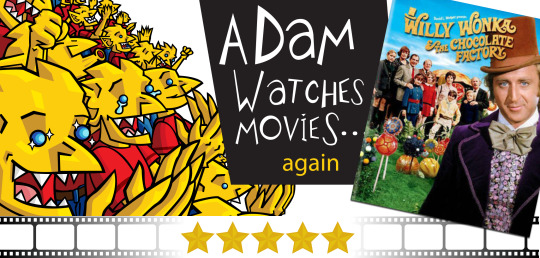
In 2005, Tim Burton directed an adaptation of Charlie and the Chocolate Factory. It was generally well-reviewed and made nearly $500 million at the box office. I’ll call it a good film. Watching 1971's Willy Wonka & the Chocolate Factory, you can understand why someone felt like it could use a remake/the book needed to be adapted again. That said, the artistic decisions at the writing, musical, performance and tonal level accompany all of the weird “of the era” choices. Combined, they make this movie the kind that transcends the decades.
Poor, kind Charlie Bucket (Peter Ostrum) lives in a small house with his mother (Diana Sowle) and his four grandparents. One day, legendary candy maker Willy Wonka (Gene Wilder) announces he has hidden five golden tickets in his world-famous Wonka Bars. The children who find them will be allowed access to his mysterious factory and receive a lifetime supply of chocolate. As the world madly scrambles to find the golden tickets, Charlie continues to believe he has a chance of finding one too.

The premise implies it, but Charlie does eventually find one of the golden tickets and he invites his beloved Grandpa Joe (Jack Albertson) to join him on the factory tour. I’m still labeling this fact as a spoiler because it’s about a third to halfway through the movie before Charlie finds his golden ticket. A sizeable chunk of the running time is dedicated to showing our hero as kind, good-hearted and full of hope despite his circumstances, while the other people who find the tickets… are exactly who you think they would be. The film teases you and builds the anticipation. Charlie is poor. He has to scratch together the money needed to buy a single Wonka bar while some of his classmates open over a hundred. There’s a cruelty to the fact that any other year, a single bar for his birthday would be the most wonderful thing Charlie could’ve dreamed of but this year, the bar is a disappointment because it doesn't contain a shiny invitation. You want Charlie to see the inside of that factory because you like him and you know what it would mean to the boy. It’s equally important that he finds one because everyone else who's going doesn’t deserve to go like he does.
Until we get to the factory, director Mel Stuart frequently cuts to gags showing us the extent of the globe's Wonkamania. Scientists have developed machines to find tickets without opening the wrappers. As the worldwide supply begins to dry up, sealed boxes of Wonka bars are sold at auction houses for ridiculous sums. We even see a woman whose husband has been kidnapped hesitating to pay the ransom: her stash of Wonka bars.
Is it a surprise that the children who find the Golden Tickets are all loathsome in their own ways? There’s the gluttonous Augustus Gloop (Michael Böllner). He loves chocolate but just looking at him constantly stuffing his face makes you feel a little ill. Next is Veruca Salt (Julie Dawn Cole). She got her ticket because her father bought millions of bars and dedicated the entire staff of his peanut factory to rip the packaging open until they found it. She's the definition of "spoiled". The last two children, chronic gum-chewer Violet Beauregarde (Denise Nickerson), and television-obsessed Mike Teevee (Paris Themmen) are brats consumed by their bad habits. I guess there’s nothing THAT bad about chewing gum the way Violet does (though her obsession is pretty gross) or the way Mike obsesses over his shows (boy does his rotten attitude make him detestable, however) but they both give you a headache. There’s something pretty funny about the fact that some of these kids’ “deadly sins” are so juvenile and you’re happy to see all of them taught a lesson.
The odd thing about Willy Wonka and the Chocolate Factory is that there aren’t any character arcs. The bad children are taught lessons but in the process, they leave the factory tour and the movie. Charlie is already the person he’s meant to be so what the film does is introduce him and the world outside the factory, introduce the other children, then whittle down the cast as we explore the chocolate-making process and get to know Willy Wonka. That’s an unusual structure but it suits the film well. We anticipate the inevitable even before realizing their lessons come with musical numbers.
The competition for which piece of music is the best is fierce. Despite going on to become a hit after its rendition by Sammy Davis, Jr. and fitting in the movie perfectly, I don’t think The Candy Man is as memorable as (I've Got a) Golden Ticket but is the latter’s ability to stick in your mind due to the music & lyrics, or because of the scene that introduces it? The real contenders are Pure Imagination and the Oompa Loompa song, which gets my vote. It’s got an iconic melody, memorable lyrics and has the added bonus of being easy to expand upon or parody. It’s another reason to look forward to the bad kids misbehaving.

There’s a lot to say about Willy Wonka and the Chocolate Factory. Visually, it’s not as slick as it could be and there are times when it’s so strange (that scary tunnel ride) that you can understand why someone said “We should try this again”. The thing is, the strange choices aren’t bugs; they’re features. Yes, it is occasionally unexpectedly weird/scary but if the movie was nothing but sweet songs and bright-eyed children learning nice lessons, it wouldn’t be any fun. The moments when Willy Wonka is a little bit nasty towards his bratty guests mirrors the way you feel about them. The release of 2023's Wonka only makes the film's evergreen quality more apparent. (November 29, 2024)
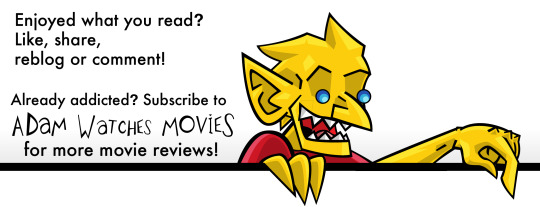
#willy wonka & the chocolate factory#charlie and the chocolate factory#movies#films#movie reviews#film reviews#Mel Stuart#Roald Dahl#Gene Wilder#Jack Albertson#Peter Ostrum#Roy Kinnear#Denise Nickerson#Leonard Stone#Julie Dawn Cole#Paris Themmen#Dodo Denney#1971 movies#1971 films#Wonka
5 notes
·
View notes
Text
Aww this is really sweet. 🥰

12 notes
·
View notes
Text

Die hier im Zusammenhang mit Wonka angekündigte gravierende cineastischen Bildungslücke, sollte den wirklich aufmerksamen Internettagebuchleser eigentlich gar nicht so verwundern wie angekündigt, weil ich sie hier schon erwähnt habe, da in Vorbereitung für das damals neue Musical: Nämlich, daß ich noch nie Willy Wonka and the Chocolate Factory mit Gene Wilder angeschaut habe. Was mich als notorischen Verfechter von Leslie-Bricusse-&-Anthony-Newley-Kindermusicals sogar selber etwas wunderte, aber irgendwie war ich immer etwas misstrauisch. Aber jetzt, und die erwarteten Lieder, kommen alle (obwohl es mir jetzt scheint, als seien es die falschen...), es ist angemessen verschroben und Gene Wilder ist natürlich ganz entzückend (der Bub auch), die Hauptirritation für hiesige Anglophile besteht aber irgendwie darin, daß das Haus der Buckets und Willy Wonkas Schokoladenfabrik sich so offensichtlich in München befinden. Dies ist jetzt Teil vergleichender Studien mit allen Willy-Wonka-Verfilmungen, die aber aber vorhersehbarerweise wohl damit enden wird, daß uns das Bühnenmusical am besten gefallen hat.
#Willy Wonka and the Chocolate Factory#Gene Wilder#Peter Ostrum#Roy Kinnear#Film gesehen#Mel Stuart#Musical#Leslie Bricusse#Anthony Newley#Roald Dahl#Charlie and the Chocolate Factory
3 notes
·
View notes
Text

Roald Dahl, September 13, 1916 – November 23, 1990.
With Gene Wilder and Peter Ostrum during the making of Mel Stuart’s Willy Wonka & the Chocolate Factory (1971).
32 notes
·
View notes
Text
Willy Wonka & the Chocolate Factory (1971)
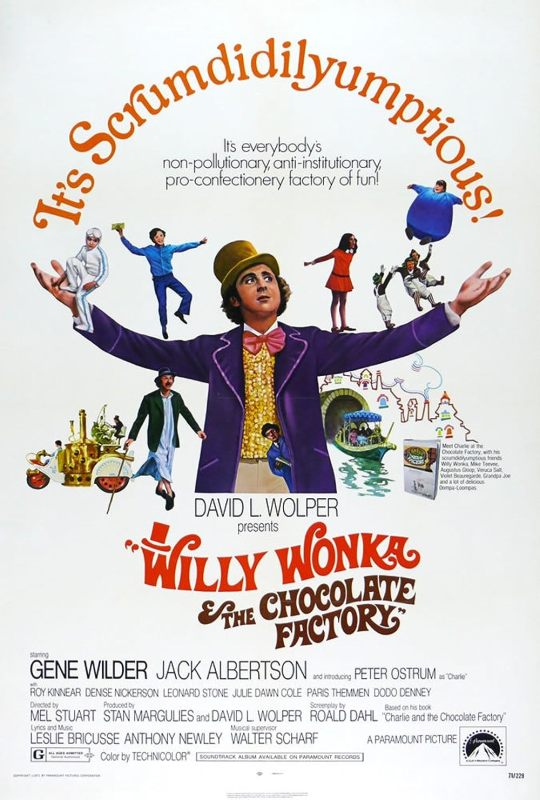
Movie #1,135 • FRIDAY WILDCARD
I will be taking a break from double posting on Mondays and Fridays in September to give myself a slight breather as I'll be on the road for much of the end of August and won't be able to take in my usual glut of cinema. This one is the lone exception as I watched it recently with my daughter after we finished the original Roald Dahl book.
For starters, it absolutely still holds up and really its only flaw is that Gene Wilder isn't in the movie until halfway through. This both heightens his appearance/role but it also makes the opening 45 minutes a tad boring by comparison.
I hadn't realized until this rewatch that Roald Dahl also penned the screenplay and briefly worked as a screenwriter as in the 60s, even penning two James Bond adaptations (for You Only Live Twice and Chitty Chitty Bang Bang). Interestingly enough he wound up disowning the final film version of Willy Wonka both because of deviations made in the production and ultimately placing too much of the emphasis on Wonka instead of Charlie (and that's obvious in the title change). But, that being said, it truly is Wilder in the titular role that makes this movie work. Visually, it is definitely fun if not dated but none of it works without his performance at the center. It's as hilarious as it is completely bizarre. Wilder presents an affect that is uncanny, almost creepy at times, but constantly engrossing. It's the rare execution that is both perfect and impossible to explain.
And not to disagree with the master Dahl, but I found most of the deviations of the original story to be mostly positive changes, especially the ending, which is a bit more complicated the book but actually strengthens the character of Charlie as well as the moral implications. The book just kind of ends with him getting the factory and I think the final twist in the film is the better conclusion.
SCORE: ⭐️⭐️⭐️⭐️⭐️⭐️⭐️⭐️⭐️
#🇺🇸#9#1971#musical#mel stuart director#gene wilder#jack albertson#peter ostrum#roy kinnear#denise nickerson#leonard stone#julie dawn cole#paris themmen#dodo denney
4 notes
·
View notes
Text
Charlie and the Chocolate Factory - The Candy Man Can on Sampo Tri-Screen Color TV
Charlie and the Chocolate Factory © by Warner Bros., Family Entertainment Inc.(FAIR USE)
Copyright Disclaimer Under Section 107 of the Copyright Act 1976, allowance is made for "fair use" for purposes such as criticism, comment, news reporting, teaching, scholarship, and research. Fair use is a use permitted by copyright statute that might otherwise be infringing. Non-profit, educational or personal use tips the balance in favor of fair use.
Sung by Aubrey Woods. The opening song to the classic Gene Wilder movie, Charlie and the Chocolate Factory. Now on the Sampo TV. Model #9519.
#CharlieAndTheChocolateFactory#GeneWilder#MelStuart#aubreywoods#anthonynewman#lesliebriscusse#thecandymancan#thecandyman#charlieandthechocolatefactory1971#Sampo#sampotv#sampotriscreentelevision#sampotriscreentelevision#sampotriscreentv#9519
#charlie and the chocolate factory#gene wilder#jack albertson#peter ostrum#mel stuart#aubrey woods#willy wonka
3 notes
·
View notes
Text
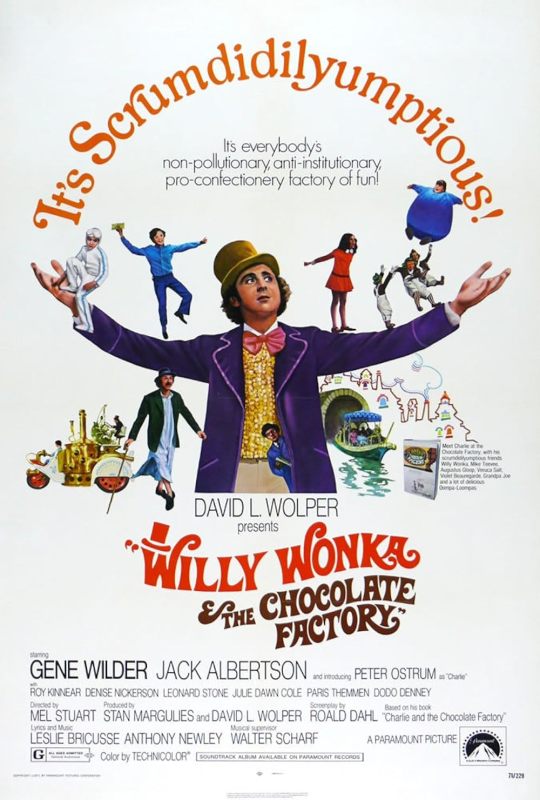
Willy Wonka & the Chocolate Factory (1971)
This is a Movie Health Community evaluation. It is intended to inform people of potential health hazards in movies and does not reflect the quality of the film itself. The information presented here has not been reviewed by any medical professionals.
Willy Wonka & the Chocolate Factory has a few scenes with cameras flashing infrequently. One late scene involves some sudden, very bright lights. When a boat enters a tunnel, there are lights that rapidly change colors, similar to strobe lights. This effect ends when the announcement is made that the boat ride is over.
All of the camera work in this film is either stationary or very smooth. The final scene of the movie depicts flight high above a city.
Flashing Lights: 4/10. Motion Sickness: 1/10.
TRIGGER WARNING: There is some disturbing imagery during the tunnel sequence, including a chicken having its head chopped off with no indication if it's previously alive or dead. Claustrophobic viewers may be disturbed by a scene of crowding in a small room, and by one of a child stuck inside a tight pipe.
Image ID: a promotional poster for Willy Wonka & the Chocolate Factory
#Movie Health Community#Health Warning#Actually Epileptic#Photosensitive Epilepsy#Seizures#Migraines#Motion Sickness#Paramount#Willy Wonka & the Chocolate Factory#June#1971#Gene Wilder#Jack Albertson#Peter Ostrum#Roy Kinnear#Denise Nickerson#Leonard Stone#Julie Dawn Cole#Paris Themmen#Dodo Denney#Mel Stuart#Rated G
6 notes
·
View notes
Text

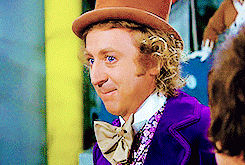


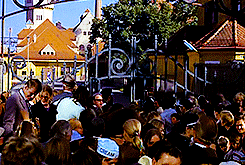



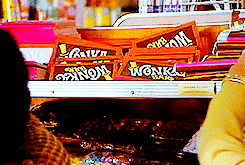
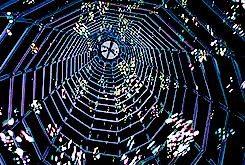
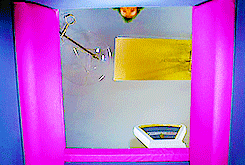
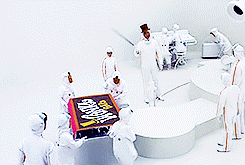


"After reading the script, Gene Wilder said he would take the role of Willy Wonka under one condition: that he would be allowed to limp and then suddenly somersault in the scene when he first meets the children. When director Mel Stuart asked why, Wilder replied that having Wonka do this meant that "from that time on, no one will know if I'm lying or telling the truth." Stuart asked, "If I say no, you won't do the picture?" Wilder said, "I'm afraid that's the truth."" | "When Gene Wilder died in 2016, Peter Ostrum changed his social media profile to "Former child actor, veterinarian, inherited a chocolate factory on August 29, 2016."" Willy Wonka & the Chocolate Factory (1971) dir. Mel Stuart
#Willy Wonka and the Chocolate Factory#Willy Wonka & the Chocolate Factory#Willy Wonka#moviegifs#filmgifs#filmedit#filmdaily#tvandfilmdaily#dailytvfilmgifs#cinemapix#doyouevenfilm#fyeahmovies#dailyflicks#moviehub#filmcentral#junkfooddaily
3K notes
·
View notes
Text
Character ask: Charlie Bucket (Charlie and the Chocolate Factory)
Requested by @comma-after-dearest
Favorite thing about them: What a kind, loving child he is. Even though he gets just one candy bar a year, he offers to share it with his parents and grandparents; when the family is starving, he refuses to let his parents give their food to him; and when he finds money in the street, he uses just a small portion of it to buy chocolate for himself and plans to give the rest to his mother. Little details like this make him truly deserving of his eventual good fortune.
Least favorite thing about them: Well, he is a bit of a bland character, and in the book he effectively earns his happy ending at the factory by doing nothing. His main purpose is to be a self-insert for child readers. It's no wonder that the 1971 film makes him slightly more flawed and allows him to make a mistake at the factory (sampling the Fizzy Lifting Drinks), only to make up for it in the end (giving Wonka back the Everlasting Gobstopper). Or that the 2013 stage musical makes him (or her, in some performances) an aspiring inventor who impresses Wonka with his/her creativity as well as goodness. Even though I haven't seen that musical yet, just read about it, I especially like that idea.
Three things I have in common with them:
*I love chocolate.
*I adored my grandparents when they were alive.
*I eat a lot of cabbage soup (for the health benefits, though, not because of poverty).
Three things I don't have in common with them:
*I'm not a little boy.
*None of my grandparents ever lived with me.
*At his age I was never quite as well-behaved or unselfish as he is.
Favorite line:
From the 1971 film, when he's trying to be brave about not finding a Golden Ticket:
"You know, I'll bet those Golden Tickets make the chocolate taste terrible."
brOTP: His parents and all his grandparents, especially Grandpa Joe, and eventually Willy Wonka.
OTP: None until he's older.
nOTP: Any adult.
Random headcanon: As the new owner of the chocolate factory, he'll get in touch with another suddenly-famous boy, James Trotter from James and the Giant Peach. (In the latter book, before the giant peach lands in the ocean, it crashes through a famous chocolate factory and sends a flood of melted chocolate into the streets: I think we can safely guess that this was the Wonka factory.) James and his insect friends will raise money to cover the damage the peach did to the factory, and Charlie will create a peach chocolate bar to commemorate their adventure.
Unpopular opinion: I don't think I have one.
Song I associate with them:
"Cheer Up, Charlie" (even though it's sung to him, not by him)
youtube
"I've Got a Golden Ticket" (even though he only sings part of it)
youtube
Favorite picture of them:
These assorted illustrations:





Peter Ostrum in the 1971 film:

Freddie Highmore in the 2005 film:

This boy actor from the 2013 stage musical:

These little girl actresses in the most recent UK tour of the musical. I know some people complain about this "woke" casting, but I like the fact that this tour had girls alternate with boys in the role and let the character be a tomboyish girl in some performances. "Charlie" is a unisex name, after all, and Charlie’s gender is irrelevant to the story.


#character ask#charlie and the chocolate factory#willy wonka and the chocolate factory#charlie bucket#roald dahl#ask game#fictional characters#fictional character ask#Youtube
9 notes
·
View notes
Text

Peter Ostrum and Gene Wilder
#willy wonka#charlie and the chocolate factory#willy wonka and the chocolate factory#gene wilder#actors#70s
12 notes
·
View notes
